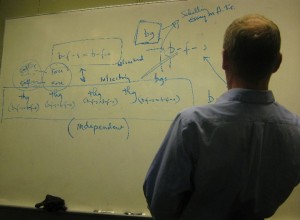There is something to be learned by reflecting on the simple expression “not here.”
 Notice how the words in “not here” function. The first word, “not,” needs the second word in order to be meaningful. The second word did not have to be “here,” but it had to be something, because the “not” is always the negation of something.
Notice how the words in “not here” function. The first word, “not,” needs the second word in order to be meaningful. The second word did not have to be “here,” but it had to be something, because the “not” is always the negation of something.
“Not,” then, is an interesting word, for it has to step outside itself, so to speak, in order for its own meaning to be established.
The expression “not here” is interesting, then, for it actually expresses the very nature of the “not” itself: in other words, it is as if the word “not” says “not here” whenever you look at it. The “not” effectively directs you to “look away from me,” “look there.”
“Not,” then, is a word, a notion, of something that is inherently an “other,” that is, it must always be one of a pair of words: it functions only when there is another word to which it is itself another.
 But now let us consider the word “here.” The word “here” seems to be precisely the opposite of “not,” in the sense that it announces that it is the place: it is the point of reference to which others are oriented, but it itself does not defer to some second co-ordinate, some “other,” like the “not” does.
But now let us consider the word “here.” The word “here” seems to be precisely the opposite of “not,” in the sense that it announces that it is the place: it is the point of reference to which others are oriented, but it itself does not defer to some second co-ordinate, some “other,” like the “not” does.
But though “here” seems thus “self-present,” so to speak, further reflection reveals a more complex situation.
First, notice that one only says “here” when one wants to pick out the correct spot from a range of other possible locations. In that way, “here” always implies “there,” even if it doesn’t explicitly say so. In this sense, this, the very meaning of “here” is “not there.”
Second, notice that the picking out of this location “here” from “there” also requires that there be the field of possible locations upon which one is now directing one’s attention. The word “here” this also differs, (by being a word), from the field of real possibilities that it serves to articulate. The word, in short is not the thing named.
 This second point is important because, whether “here” is an actual word we say out loud or whether it’s just the “sense” of the attitude we bring to bear on a situation, that articulation is always a way of taking up a field of possibility—it is a change, an interpretation, or an actualization of the situation. Such a change, interpretation or actualization is a negating of the situation, not in the sense of a denial or destruction of it, but in the sense of a transformative engagement with it.
This second point is important because, whether “here” is an actual word we say out loud or whether it’s just the “sense” of the attitude we bring to bear on a situation, that articulation is always a way of taking up a field of possibility—it is a change, an interpretation, or an actualization of the situation. Such a change, interpretation or actualization is a negating of the situation, not in the sense of a denial or destruction of it, but in the sense of a transformative engagement with it.
So “here,” then is itself a form of “not”!
(Incidentally, various others words I’ve used, such as “first,” “this” and “now,” could also be thought through in this same way. And the word “is” . . .)
 Initially, we noticed the essential “othering” character of “not.” We can now see that what initially looked simply like the peculiar meaning of this word is in fact the essential character of our spatial experience, (for our inhabitation of space is inherently a navigating of “here” and “there”), language as such, (for the sign that articulates is inherently differentiated from what it names), and experience as such (for our attitude is always shaped by a way of interpreting and articulating). (And if we had explored words like “now,” “first” and “this,” we would have found the same to be true of temporality, quantity and quality.)
Initially, we noticed the essential “othering” character of “not.” We can now see that what initially looked simply like the peculiar meaning of this word is in fact the essential character of our spatial experience, (for our inhabitation of space is inherently a navigating of “here” and “there”), language as such, (for the sign that articulates is inherently differentiated from what it names), and experience as such (for our attitude is always shaped by a way of interpreting and articulating). (And if we had explored words like “now,” “first” and “this,” we would have found the same to be true of temporality, quantity and quality.)
Surprisingly, then, the expression “not here” seems to hold the key to understanding just about everything. In being “not here,” it’s actually everywhere. (And then, again, if we tried to take on “is” . . .)


 Participants in these
seminars consistently have the experience of growth in their conversation and
conceptual abilities, and typically leave with a transformed sense of the nature
and possibilities of philosophy.
Participants in these
seminars consistently have the experience of growth in their conversation and
conceptual abilities, and typically leave with a transformed sense of the nature
and possibilities of philosophy.





2 Comments
Your discussion here brings home to me just how much Hegel’s chapter on sense certainty in a very strong way contains the whole of what follows in _The Phenomenology of Spirit_! The importance of making a good beginning and understanding one’s beginning also comes through here. I’ll direct my Hegel students to this post.
Just today, I read this in King Lear: “the worst is not / So long as we can say ‘This is the worst'” (IV.1).